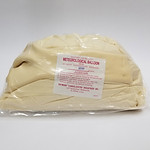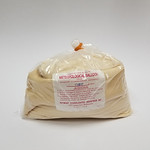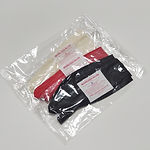
NATURAL LATEX BALLOONS
TOTEX Meteorological Balloons are the global standard for weather forecasting, high altitude studies, near space photography and military applications. Every balloon below is 100% biodegradable natural latex, preservative free and offers unrivaled consistency and performance.
Quick Resources:

100g PIBAL Balloon (Multiple NSN's Below)
The 100 gram PIBAL Balloon is available in black, red and natural color and can carry a lightweight radiosonde in various conditions. These balloons can carry small instruments that determine cloud height, wind speed, wind direction, RH, temperature and pressure.
KCI-100N (NSN: 6660-00-663-8154)
KCI-100R (NSN: 6660-00-151-7772)
KCI-100B (NSN: 6660-00-151-7773)

350g Meteorological Balloon (NSN: 6660-01-544-6485)
In 2009, engineering students from MIT conducted "Project Icarus," launching a 350g Kaymont balloon with a photographic payload to 93,000 feet. The success of their project on a $150 budget paved the way for low cost near-space photography, which continues to this day with ever more advanced payloads. When properly launched, our 350g balloon with a 1-2lb payload will reach an estimated 68,000- 78,000 ft (20726- 23774 m) burst altitude.

600g Meteorological Balloon (NSN: 6660-00-553-4641)
The Kaymont 600g is an excellent intermediate sized balloon, and we commonly recommended this size for education and training. Before launching balloons larger than this, we suggest users familiarize themselves with the safe handling, inflation, payload attachment and tie-off procedures that are critical to successful weather balloon launches. When properly launched, our 600g balloon with a 2lb payload will reach an estimated 82,000- 92,000 ft (24993- 28041 m) burst altitude.

800g Meteorological Balloon (NSN: 6660-01-566-6648)
These balloons are recommended for individuals or groups who have experience in high altitude balloon launches. Balloons are ideally inflated with a target ascent rate of approximately 5 meters per second. When properly launched, our 800g balloon with a 2-4lb payload will reach an estimated 90,000- 100,000 ft (27432- 30480 m) burst altitude.

1000g Meteorological Balloon (NSN: 6660-01-498-3855)
The 1000 gram balloon is the workhorse for gathering upper air data before US Space Force test ranges on both the East and West coast. Balloons are ideally inflated with a target ascent rate of approximately 5 meters per second. When properly launched, our 1000g balloon with a 2-4lb payload will reach an estimated 95,000- 105,000 ft (28956- 32200 m) burst altitude.

1200g Meteorological Balloon (NSN: 6660-00-914-2545)
The 1200 gram balloon sets the standard for ozone research across the globe. Balloons are ideally inflated with a target ascent rate of approximately 5 meters per second. When properly launched, our 1200g balloon with a 2-4lb payload will reach an estimated 100,000- 110,000 ft (30480- 33528 m) burst altitude.

1500g Meteorological Balloon
The 1500 gram balloon is an extremely popular choice for high altitude photography. With a 4 to 8 pound payload, users can expect to consistently reach over 100,000 ft. When launching this type balloon, and payloads of this weight, it is assumed that the operators have prior launch experience and are familiar with FAA requirements. Balloons are ideally inflated with a target ascent rate of 5 meters per second. When properly launched, our 1500g balloon with a 4-8lb payload will reach an estimated 105,000- 115,000 ft (32004- 35052 m) burst altitude.

1600g Meteorological Balloon (Kaymont Exclusive)
Introduced in 2021, the 1600 gram balloon fills a unique request from high altitude ballooning enthusiasts. The 1600g balloon offers a slight competitive edge over the 1500g balloon, when every foot of altitude counts. When launching this type of balloon, and payloads of this weight, it is assumed that the operators have prior launch experience and are familiar with FAA requirements. Balloons are ideally inflated with a target ascent rate of 5 meters per second. When properly launched, our 1600g balloon with a 4-8lb payload will reach an estimated 105,000- 115,000 ft (32004- 35052 m) burst altitude.

1800g Meteorological Balloon (Kaymont Exclusive)
Introduced in 2021, the 1800 gram balloon fills the gap between our 1600 and 2000 gram balloons. When launching this type balloon, and payloads of this weight, it is assumed that the operators have prior launch experience and are familiar with FAA requirements. Balloons are ideally inflated with a target ascent rate of 5 meters per second. When properly launched, our 1800g balloon with a 4-8lb payload will reach an estimated 107,000- 117,000 ft (32613- 35661 m) burst altitude.

2000g Meteorological Balloon
The 2000 gram balloon is designed for heavier payloads, with a reinforced 5cm neck and expanded lifting capacity. These balloons are made to lift heavier payloads to altitudes reaching over 110,000 feet. Balloons are ideally inflated with a target ascent rate of 5 meters per second. When properly launched, our 2000g balloon with a 4-8lb payload will reach an estimated 108,000- 118,000 ft (32918- 35966 m) burst altitude.

3000g Meteorological Balloon
The 3000 gram balloon is the ultimate workhorse for heavy payloads, and is responsible for setting multiple world records for exceptional feats of high altitude ballooning. In 2016, Third Man Records, the Nashville label founded by Jack White, launched a gold-plated vinyl copy of Carl Sagan's "A Glorious Dawn" actively playing on a turntable lifted by a Kaymont 3000 gram balloon to 94,000 ft. The payload was 25lbs. When properly launched, our 3000g balloon with a 4-8lb payload will reach an estimated 115,000- 125,000 ft (35052- 38100 m) burst altitude.

4000g Meteorological Balloon
The 4000 gram balloon is the MOAB, Mother of All (Weather) Balloons. Despite a long track record of successful high-altitude launches, we still consider the 4000g an experimental balloon, due to its incredible size and lifting capacity. The 4000g balloon is typically excluded from burst calculators and we only recommend this balloon for users with extensive high altitude balloon experience. When properly launched, our 4000g balloon with an 4-8lb payload will reach an estimated 120,000- 130,000 ft (36576- 39624 m) burst altitude.

TX SERIES BALLOONS
COLD WEATHER COMPOUND HIGH PERFORMANCE BALLOONS
TX Series balloons offer a narrow burst window on the upper end of each balloon's
expected performance. These balloons are manufactured specifically to shed moisture
as they rise through the atmosphere, and offer more thermal protection against
high altitude freezing effects. These balloons are rated to survive temperatures
lower than -75°C in the tropopause.

600g TX Series Meteorological Balloon
The Kaymont TX-600g balloon is an excellent intermediate sized balloon, and we commonly recommended this balloon for education and training. Before launching balloons larger than this, we suggest users familiarize themselves with the safe handling, inflation, payload attachment and tie-off procedures that are critical to successful weather balloon launches. When properly launched, our TX-600g balloon with a 2lb payload will reach an estimated 88,000- 92,000 ft (26822- 28041 m) burst altitude.

800g TX Series Meteorological Balloon
These balloons are recommended for individuals or groups who have experience in high altitude balloon launches. Balloons are ideally inflated with a target ascent rate of approximately 5 meters per second. When properly launched, our TX-800g balloon with a 2-4lb payload will reach an estimated 95,000- 100,000 ft (28956- 30480 m) burst altitude.

1000g TX Series Meteorological Balloon
The 1000 gram balloon is the workhorse for gathering upper air data before US Space Force test ranges on both the East and West coast. Balloons are ideally inflated with a target ascent rate of approximately 5 meters per second. When properly launched, our TX-1000g balloon with a 2-4lb payload will reach an estimated 1000,000- 105,000 ft (30480- 32200 m) burst altitude.

1200g TX Series Meteorological Balloon
The 1200 gram balloon sets the standard for ozone research across the globe. Balloons are ideally inflated with a target ascent rate of approximately 5 meters per second. When properly launched, our TX-1200g balloon with a 2-4lb payload will reach an estimated 105,000- 110,000 ft (32004- 33528 m) burst altitude.

1500g TX Series Meteorological Balloon
The 1500 gram balloon is an extremely popular choice for high altitude photography. With a 4 to 8 pound payload, users can expect to consistently reach over 100,000 ft. When launching this type balloon, and payloads of this weight, it is assumed that the operators have prior launch experience and are familiar with FAA requirements. Balloons are ideally inflated with a target ascent rate of 5 meters per second. When properly launched, our TX-1500g balloon with a 4-8lb payload will reach an estimated 110,000- 115,000 ft (33528- 35052 m) burst altitude.

1600g TX Series Meteorological Balloon (Kaymont Exclusive)
Introduced in 2021, the 1600 gram balloon fills a unique request from high altitude ballooning enthusiasts. The 1600g balloon offers a slight competitive edge over the 1500g balloon, when every foot of altitude counts. When launching this type balloon, and payloads of this weight, it is assumed that the operators have prior launch experience and are familiar with FAA requirements. Balloons are ideally inflated with a target ascent rate of 5 meters per second. When properly launched, our TX-1600g balloon with a 4-8lb payload will reach an estimated 110,000- 115,000 ft (33528- 35052 m) burst altitude.

2000g TX Series Meteorological Balloon
The 2000 gram balloon is designed for heavier payloads, with a reinforced 5cm neck and expanded lifting capacity. These balloons are made to lift heavier payloads to altitudes reaching over 110,000 feet. Balloons are ideally inflated with a target ascent rate of 5 meters per second. When properly launched, our TX-2000g balloon with a 4-8lb payload will reach an estimated 112,000- 118,000 ft (34137- 35966 m) burst altitude.

3000g TX Series Meteorological Balloon
The 3000 gram balloon is the ultimate workhorse for heavy payloads, and is responsible for setting multiple world records for exceptional feats of high altitude ballooning. In 2016, Third Man Records, the Nashville label founded by Jack White, launched a gold-plated vinyl copy of Carl Sagan's "A Glorious Dawn" actively playing on a turntable lifted by a Kaymont 3000 gram balloon to 94,000 ft. The payload was 25lbs. When properly launched, our TX-3000g balloon with a 4-8lb payload will reach an estimated 120,000- 125,000 ft (36576- 38100 m) burst altitude.

4000g TX SeriesMeteorological Balloon
The 4000 gram balloon is the MOAB, Mother of All (Weather) Balloons. Despite a long track record of successful high-altitude launches, we still consider the 4000g an experimental balloon, due to its incredible size and lifting capacity. The 4000g balloon is typically excluded from burst calculators and we only recommend this balloon for users with extensive high altitude balloon experience. When properly launched, our TX-4000g balloon with an 4-8lb payload will reach an estimated 125,000- 130,000 ft (38100- 39624 m) burst altitude.
REQUEST A QUOTE
Want to discuss an upcoming launch or chat about weather balloons? Give us a call during our business hours and you'll reach a real person.
Phone: (631) 951-9100
Fax: (321) 610-1459
Your contact and message information (including email) will never be shared, rented or sold to another party.
*Required Field






